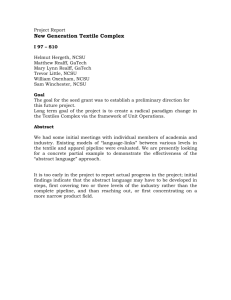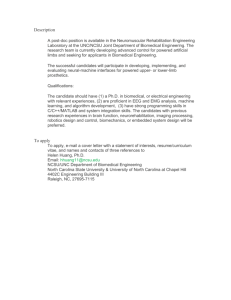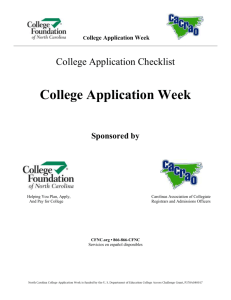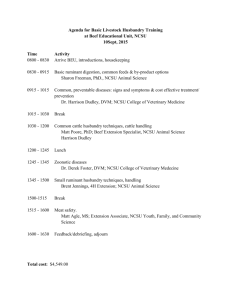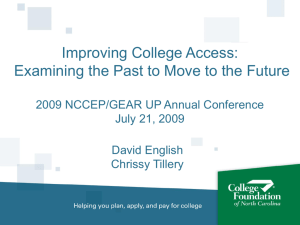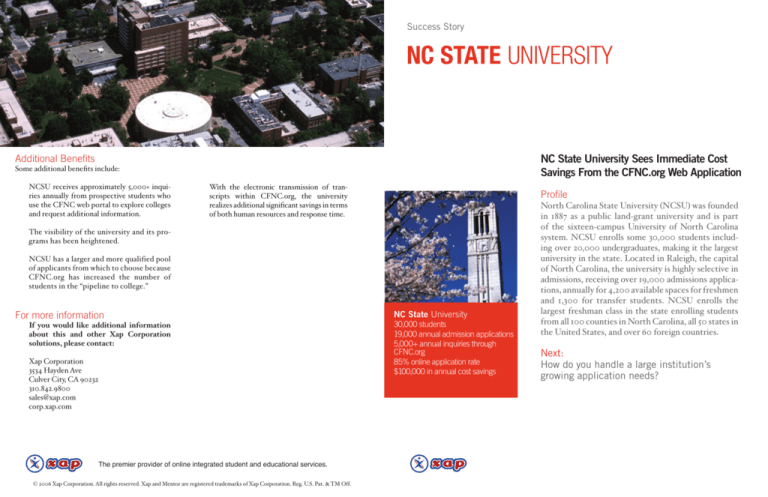
Success Story
NC STATE UNIVERSITY
NC State University Sees Immediate Cost
Savings From the CFNC.org Web Application
Additional Benefits
Some additional benefits include:
NCSU receives approximately 5,000+ inquiries annually from prospective students who
use the CFNC web portal to explore colleges
and request additional information.
With the electronic transmission of transcripts within CFNC.org, the university
realizes additional significant savings in terms
of both human resources and response time.
Profile
The visibility of the university and its programs has been heightened.
NCSU has a larger and more qualified pool
of applicants from which to choose because
CFNC.org has increased the number of
students in the “pipeline to college.”
For more information
If you would like additional information
about this and other Xap Corporation
solutions, please contact:
Xap Corporation
3534 Hayden Ave
Culver City, CA 90232
310.842.9800
sales@xap.com
corp.xap.com
The premier provider of online integrated student and educational services.
© 2006 Xap Corporation. All rights reserved. Xap and Mentor are registered trademarks of Xap Corporation. Reg. U.S. Pat. & TM Off.
NC State University
30,000 students
19,000 annual admission applications
5,000+ annual inquiries through
CFNC.org
85% online application rate
$100,000 in annual cost savings
North Carolina State University (NCSU) was founded
in 1887 as a public land-grant university and is part
of the sixteen-campus University of North Carolina
system. NCSU enrolls some 30,000 students including over 20,000 undergraduates, making it the largest
university in the state. Located in Raleigh, the capital
of North Carolina, the university is highly selective in
admissions, receiving over 19,000 admissions applications, annually for 4,200 available spaces for freshmen
and 1,300 for transfer students. NCSU enrolls the
largest freshman class in the state enrolling students
from all 100 counties in North Carolina, all 50 states in
the United States, and over 60 foreign countries.
Next:
How do you handle a large institution’s
growing application needs?
Challenges
The mid 1990’s saw the beginning of higher education’s move towards technology as a tool to expand
outreach efforts to prospective students as well as
enhance services to applicants. As North Carolina’s
flagship science-and-technology institution, NCSU
quickly embraced the move to Internet-based admissions activities. The university’s first effort at
using Internet technology was the development of
a “home-grown” electronic application attached to
a first-generation admissions website.
“CFNC.org has been a
valuable tool for NCSU.
Most importantly, we
share CFNC.org’s
commitment to
college access.”
Thomas H. Griffin
Director of Undergraduate Admissions
The campus-developed application served the
university well for several years, but limitations
became apparent as vendor-developed applications began providing enhanced features that the
home-grown system could not match. Specifically,
dynamic system-upload capabilities, customized
application features, and the ability to tailor a
communication plan for students had become the
standard. Subsequent vendor-purchased software
also became outdated after several years, in that it
did not provide a comprehensive solution and had
annual cost implications for the university and
participating students.
Next:
So how did the university
meet students’ needs
while saving institutional money?
Solution
In 1999, the State of North Carolina launched a
statewide comprehensive college-access initiative
to address the state’s need for a better-educated
workforce as a result of its shifting economic and
demographic climate. The state’s manufacturing jobs, long the staple of the state’s economy,
were shifting overseas and knowledge-based jobs
were appearing in their place. This new initiative,
called “Pathways,” features a college-access web
portal, originally named NCMentor, developed
by the Xap Corporation, which was one of very
few proposals that responded to the shift towards
a state-funded model.
The state chose the Mentor system as its college
access portal because of its comprehensive offering
that provides students with one place where they
could get information to help “plan, apply, and pay”
for college. Ultimately branded CFNC.org, the
Mentor portal provides, among other tools, statefunded online applications for all 110 North Carolina higher-education institutions. The NCSU Admissions Office did a side-by-side comparison of
its older vendor-provided online application and
the CFNC.org application for a year. After careful
review of the application provided on CFNC.org,
NCSU determined that the Mentor application
on CFNC.org, by itself, could meet all of NCSU’s
electronic-application needs.
Results
Since beginning use of the CFNC.org admissions
application, NCSU has been able to maximize resources and achieve improvements in efficiency.
Some of the benefits include:
Human resources: CFNC.org created
processing efficiencies and hence costsavings, which enabled NCSU to retain a
full-time clerical staff member who would
otherwise have been terminated for lack
of funding. The loss of a full-time staff
member would have adversely impacted
NCSU’s ability to sustain quality service to
its students and prospective students.
Cost savings: CFNC.org allowed the admissions office to terminate its vendor-provided
application software resulting in savings to
NCSU applicants of approximately $75,000 a
year.
Meeting college application processing
needs: NCSU receives the largest volume of
CFNC.org applications. The university now
receives over 85% of its 18,000+ applications
for admission through CFNC.org and has
seen its yearly application numbers increase
along with both the quality and diversity of
each entering class.
“CFNC.org has helped us save
money by providing the online
application at no cost to the
university and the applicant.”
Thomas H. Griffin
Director of Undergraduate Admissions
Faster response time: Applicants are notified
of their admission status within two to three
weeks after applications are received and reviewed, as opposed to six to eight weeks.
Available help line: There is a toll-free hotline available for applicants from early morning
to late evening.
Increased accessibility: The application is
available 24/7 with no local maintenance or upkeep required by the university.
Transcript exchange capability: CFNC.org
allows high schools to transmit transcripts
directly to the university for more efficient
application processing.



